|
< Earlier Kibitzing · PAGE 12 OF 77 ·
Later Kibitzing> |
| May-09-09 | | hms123: <crawfb5> The book is actually much worse than you think. There are chapters on Gadamer, Hip Hop Tactics (don't ask), Habermas, and Game theory. I wish there were something as useful as philosophy of science. |
|
May-09-09
 | | jessicafischerqueen: <Big Crawdaddy>
First, hats off to you for supplying the source of the joke! (I would have simply taken credit for it myself)
Second, as you well know, neither the book review you quote- nor, apparently, the book under review-- supports the notion that this joke is actually true. It is a pitfall of positivism in general to make such categorical statments- and the terms need to be defined sharply as I said. Viz- if you employ a broad enough definition of "science", then you can just say that any analysis of "science" is also an example of "science." But if you take that path, then you have to say that no analysis is valid unless it conforms precisely to the epistemological standard of science. This is a worthy goal, to be sure- but one might argue that the reason so many people find fault with social science is because it tries to copy the epistemological standard of "real science" where it cannot accurately be copied. This point is alluded to in the review you posted, in fact. Also- very interesting notion by the reviewer that a philosophy of science should be more "descriptive" than "prescriptive"-- It's true that science should, arguably, be left to its own devices. You don't want a public policy maker acting on some cockeyed "philosophy of science" and making bonehead policy- say, a <Sarah Palin>, for example. However, by the same token- you don't want a different type of bonehead making policy- say, a <Adolf Hitler>, to continue the example I used earlier. Also, recall that a "descriptive" analysis is not necessarily denuded of punch. However, all that said, I do agree that there is "some truth" to the joke. If there weren't, we wouldn't find it funny. Great book review BTW, thanks for posting it. |
|
| May-09-09 | | crawfb5: Yes, that's the problem with trying to build a theory of something when you aren't a practitioner -- it often isn't very useful and the practitioners don't take you very seriously. It sounds like the contributors aren't very good chessplayers. |
|
May-09-09
 | | jessicafischerqueen: <H> so the book in question is such bad "philosophy of science" that it's not even philosophy of science- which you concede could be useful. OK I get that. Relieved to hear it in fact.
So you're saying I should read this book? That's the part I'm still a little unclear on. |
|
| May-09-09 | | hms123: <jess> No, spend your time and money elsewhere. |
|
| May-09-09 | | crawfb5: <jess> I am always happy to illuminate, although not officially one of the illuminati... Second, I actually <did> take credit. Check your source material more <crawf>ully... Third, while Laudan, in his two books reviewed, <does> argue for a more "descriptive" approach to PoS, even the more "proscriptive" systems of which I am aware do not do so in any ethical sense, but try to specify what kinds of research science should or should not do to advance. The joke is a barb aimed at the notion that philosophers know better how science ought to be done than do working scientists. Laudan was interested in approaching the problem from the other direction; if we look at how actual scientists <do> science, can we abstract any useful principles of science as an intellectual activity? And last but not least, I would advocate keeping ham-handed public policy makers as far away from science as humanly possible... |
|
May-09-09
 | | Phony Benoni: <crawfb5: Yes, that's the problem with trying to build a theory of something when you aren't a practitioner -- it often isn't very useful and the practitioners don't take you very seriously.> Which also describes certain chess writers--or, perhaps more accurately, chess writer wannabes. |
|
May-10-09
 | | jessicafischerqueen: <Big Crawdaddy>
I've replied to your kind elaboration over at <Howard's House of Fun>, since my comments on the matter are "off topic" here. Not <Phony Benoni's> comment there though. heh--
My dear <Mr. Benoni>, I should like also to extend your disapprobrium to "certain chess youtube video analysts"-- I was "learning" from one of the more prolific of these gentelman until I had the accidental opportunity of playing him twice in a correspondence tournament- at which point I discovered that he was a TOTAL BEGINNER at the game. I mean playing at a sub- 1000 ratings level, in my estimation. I've never felt comfortable "learning" from his videos since then. So I no longer watch them- although he is prolific on <youtube>, like I said. Which I think is ridiculous- but hey it's a free internet. Although I continue to feel comfortable learning from the first and second place finishers of that particular tournament- <Canstein> and <Kingscrusher>-- They both crushed me.
I like my teachers to know more than I do about the subject they are teaching, or, in some cases, "teaching." |
|
| May-10-09 | | kellmano: <hms123: <kellmano> Please tell me more about the book "Zugswang". I like spy novels, but don't know that book or that author. thanks--hms> I bought it for a quid in a closing down bookshop just cos of it's title. Chesswise it's very accurate. The central chess character is clearly based on Rubinstein, one of my favourite players, and there are a few diagrams of chess positions in the book. The author is obviously a chess fan, just like Stefan Zweig. Incidentally, Zweig appears to be getting the recognition he deserves at the moment as well. I don't know why, but have seen a few people reading his stuff. One of his books was Book at Bedtime on radio 4 - that might be a factor. |
|
| May-10-09 | | hms123: <kellmano> Thanks--I will look for it in some used book stores around here. |
|
| May-11-09 | | zanshin: <Part II Chapter Summary Modern Chess Analysis by Robin Smith 2004> The general approach used by Smith is to differentiate between the analysis methods used by human GMs versus chess engines and to highlight types of positions where engines are not reliable. His purpose is not to denigrate engines, but to show how they can be used more effectively in analysis. The key chapters are the first two which discuss differences between human and engine analysis, and specific methods used in chess ananlysis. The remainder of the book applies these principles to various phases of the game. Presentation is effective for learning, though necessarily repetitive. Introduction - Covers the need for analysis, how to select computers and engines - make sure you can run multiple engines; select a PC based on processor speed; avoid Macs because chess software is limited; do not obsess with hash table size (32 MB is fine), and don't worry about tablebases - the effect is usually small. Chap 1 - relative strengths of computers versus humans (and resulting implications for computer-aided analysis): Computer strength is in calculation: eg. calculation to checkmate and of material, as well as of tablebase endings. Humans analyze <schematically>, ie by setting objective or goal, afterwards calculating path to accomplishment. In contrast, computers search and evaluate as many positions as possible and recommend the move that produced the best evaluation result. Computer analysis is one-dimensional. By necessity, all aspects of a position are encapsulated into a single value. People evaluate several factors at once. A person might make a move towards a long-term objective even if s/he is unsure the objective will be realized - computers will not. As a result, computers are better at messy open positions with pawns missing. People are better in closed positions with all pawns present, where long-term play is important, or where material is unbalanced - in short, where schematic thinking is needed and rules may not apply. Signs an engine doesn't 'understand' a position: evaluation jumps around or shows no long term trend; main lines show shuffling of pieces. <Smith - Brandhorst 1990> highlights the difference between a schematic vs computer analysis: 
click for larger viewEngines evaluate the position as roughly equal - although White has greater mobility in exchange for material (Rybka 3 eval was +0.95 d=17). In the game, Black resigned because he knew his immobility was permanent. To gain mobility would require a sac such as Ba7, Bc7 or Ra6 leaving him down both materially and positionally. |
|
| May-11-09 | | zanshin: <Part III Chapter Summary cont. Modern Chess Analysis by Robin Smith 2004> Chap. 2 - computer-aided analysis methods:
1. interactive analysis - The most powerful method in chess analysis is to use an engine to check short-term tactics up and down a line, hopefully being guided by the human towards a long-term goal. This covers the gamut of sliding forward and backward, IDeA, and other variations requiring input from the human analyst. Do not pay too much attention to the entire line. Some engines (eg Shredder) extract the lines from the hash tables and can be meaningless. Short vs Timman, 1991

click for larger viewEngines cannot see the strategy of mating with the King (starting with <31.Kh2>) until deep into the line or unless sliding back from the won position. 2. multi-variation mode - Set the engine to display the top two lines to check for forced moves. Smith generally recommends against this practice in extended analysis. 3. multiple engines - Running multiple engines concurrently may be more effective than a single engine for an extended period. This minimizes the effects of program bugs in certain positions. 4. engine tournaments - This can be tricky, but you set up the position and let engines play out the game to get a feel for strategies involved and which side might have an advantage. 5. deep position analysis - Automated analysis such as DPA are useful only in positions computers understand but still needs monitoring and occasional adjustment of settings. Unsupervised, it is unreliable. 6. auto-annotation and blunderchecking - This usually starts from the end of the game - the output is more reliable because the outcome is known. As expected, the method is unreliable in closed, schematic positions. But in open tactical ones, blunderchecking operates at the super GM level. Chap 3. Opening Analysis -
1. Game database statistics - can be unreliable e.g. when a refutation has been found 2. Annotated games
3. Use of the bookup program (http://www.bookup.com/) - stores positions, not games Chap 4. Middle game analysis - The longest of the game phase chapters covers various types of positions where computers are weak. There is an interesting section on when to recognize that the game is entering a critical position. When search is deep enough, computers can play positionally (including positional sacrifices) if there is sufficient tactical justification. Chap 5. Endgame analysis - According to Smith, in addition to deciding when to exchange pieces, the transition to endgame is the weakest aspect of chess engines. Techniques to analyze endgames include endgame database statistics and tablebases. It's probably best to keep tablebase settings to default values. Errors will occur if your tablebases are incomplete. Chap 6. Putting it all together - Shows complete analysis of full games, including Kasparov vs The World, 1999. Final advice includes: never over- or under-estimate engines, use more than one, watch out for positions where engines are weak; use the appopriate analytical method(s); be careful with automated analysis. In general, Smith explains and reinforces many concepts familiar to us, but does so with examples and clarity that is unmatched. |
|
| May-11-09 | | hms123: <zanshin> That's very complete. It sounds like the book might be worth getting for someone interested in this area. |
|
| May-11-09 | | zanshin: <howard> I am not yet done. I am saving what I consider the best for last. I am extracting from the book the types of positions engines do not 'understand' and selecting the best example (for me anyway). The review is getting to look like a chess lesson, but so be it. I have taken notes and done some of my own analysis. I decided to just show everything since I already had it (or will have it anyway). I have selected 8 games (for now). Still a small segment of the book since there are about 100 games and positions in total. I am enjoying this book quite a lot, even if it seems too much like work ;-) |
|
| May-11-09 | | hms123: <zanshin> wow! Now I am really impressed. |
|
| May-11-09 | | just a kid: Anyone know a good book that maybe helps you psychologically at chess? |
|
| May-11-09 | | zanshin: <JaK> What about this? http://www.chessville.com/reviews/C... |
|
May-12-09
 | | jessicafischerqueen: Im slowly going through <Silman's Complete Endgame Course>, practicing the lessons against my Engine. You know- I'm finding that even the material from the Beginner's section is helpful to me. Since I haven't really studied the end game from the "bottom up" before. <Silman> gives handy tips that are probably obvious to everyone else but not me. Example- "In Queen v. Bishop endgames, just pretend the enemy bishop doesn't exist and stay off its color. Pretend it's the same as a Queen v. lone King endgame." In practice, just from this one tip, I can now Mate in this endgame quickly and efficiently. Unlike when I was trying to convert a Queen v. Bishop endgame I reached against Shredder when playing out a GM-resigned position last month-- I was getting frustrated and wasting all kinds of moves till I started to feel retarded. No more!! |
|
May-12-09
 | | jessicafischerqueen: <Tyler>
Here is a <youtube> chess channel that features live interviews with many <Chess Masters>. These BIG FISH have some very useful things to say about "chess psychology," IMO: http://www.youtube.com/user/FunJr |
|
| May-12-09 | | blacksburg: ooohhh cool youtube channel, very interesting. |
|
| May-12-09 | | zanshin: <Part IV Types of positions misevaluated by engines, excerps from Modern Chess Analysis by Robin Smith 2004> Chess engine users learn certain generalities, eg, engines are best at tactics, humans at positional chess. Smith clarifies the exact meaning of statements like this and provides clear examples. As previously discussed, engines have difficulties with positions requiring schematic analysis, where rules do not apply or imbalances exist. I have extracted throughout the book what I consider to be the most important types of positions and the best examples. <1. exchange sacrifices> - Engines have difficulties evaluating material loss for positional considerations. In Kasparov vs Shirov, 1994 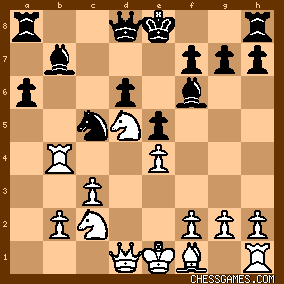
click for larger viewKasparov played <17.Rxb7!> dominating the light squares, especially d5. (See John Nunn's comments quoted on the gamepage) (Rybka 3 [+0.12] d=20 17.Nce3) <2. box canyons> - ie forced lines. (The term is taken from canyons in the American southwest where floods have carved out a single path forward) Engine evals may be quite different at the entrance and exit of a box canyon. In Nunn vs Van der Wiel, 1982, Nunn played <29.e5?!> entering a box canyon until move 40 that he felt was won (and too many plies away for engines to analyze). Engines prefer <29.Rc1> or <29.Rxg8>. The point about forcing lines I think is a good one, but I don't like the example (the only game example). Rybka eval at the entrance to the box canyon ( [+2.66] d=18 29.Rc1) is higher than at the exit ( [+1.00] d=18 40...e5). <3. Prisons> - trap a piece, requiring a sacrifice to escape. From Timman vs P Nikolic, 1987, engines will want to play <24.Be2?> likely leading to a draw (Rybka 3 [+0.68] d=23 24.Be2). 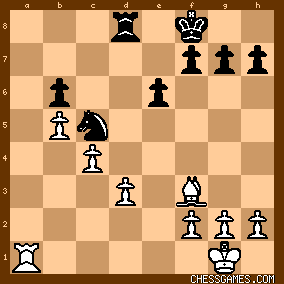
click for larger viewTimman played <24. Ra6! Nxa6 25. bxa6 Rd7 26. Kf1 Ra7 27.Bb7> 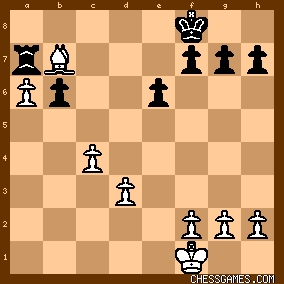
click for larger view imprisoning the Rook and winning the game. <4. King drift> refers to gradual movement of pawns and pieces towards the King. Engines often do not sense the danger before it is too late. In Smirin vs Shredder, 2002, Shredder allows King drift by playing weak moves in the opening. |
|
May-12-09
 | | ChessBookForum: Here is a repost of some comments about a book that sounds very interesting>: <Max Lange>: Yes, it's all in the excellent albeit obscure book "Shady Side: The Life and Crimes of Norman Tweed Whitaker, Chess Master" by John S. Hilbert (2000). Whitaker played the "Who's Who" of American chess, and beat them. He clearly had some behavioral problems however (besides extortion, he got busted, after being a patent attorney, for car theft and for indecent acts with a 12 year old girl). Whitaker battled with the USCF (not unlike some people battle today at rec.games.chess.politics at Google) over a variety of issues, including whether he should be granted an IM title, which he eventually won. (original post is here: Norman Tweed Whitaker) <whiteshark>: <Shady Side: The Life and Crimes of Norman Tweed Whitaker Chess Master> by John Hilbert, 481pp., Hardcover (Caissa Editions 2000) A chronicle of America's most notorious chess master based on many of his own papers. Includes a detailed story of his life, his loves, his cons, and his many chess experiences in a 60 year career, along with <570> of his games (some with full notes). Much US chess history and some excellent photos are a notable part of the book. Yorklyn, 2000. This book won the ChessCafe "Book of the Year" award for 2000. (original post is here: Norman Tweed Whitaker) |
|
| May-12-09 | | zanshin: <Part V Types of positions misevaluated by engines cont, excerpts from Modern Chess Analysis by Robin Smith 2004> <5. material imbalances> Positions with significant material imbalances are difficult for engines to evaluate (eg where one side has sacrificed material for a positional bind). In the position below from Junior 8 - Hiarcs 8 2003, different engines evaluated the position as +2.5 to slight advantage to Black. 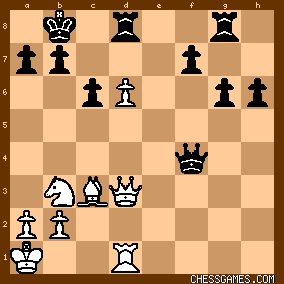
click for larger viewWhite probably has the advantage and eventually won. Positions like this are good candidates for engine matches. <6. quiet positions> When short term tactical gain is clear, engines are very purposeful. However, they can struggle in positions where there are no clear short term objectives. In R Knaak vs Geller, 1982, White needs to re-position his Bishop to b3, Rook b1 to d1, Knight to f4 all with pressure on d5. All engines tested preferred <22.h6?> (Rybka 3 [+0.69] d=19 22.h6) 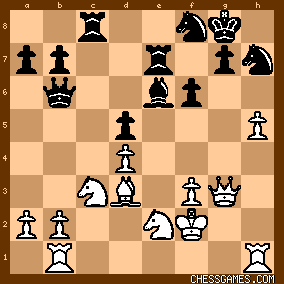
click for larger view<7. fortresses> - are formations that prevent forces from breaking in. This technique is usually found in the endgame to hold a draw under material disadvantage. Black has played <45...Qb6?!> in A Petrosian vs L Hazai, 1970 
click for larger viewEngines cannot resist taking the Queen with high material gain. (Rybka 3 [+6.76] d=22 46.Nxb6 (0:08.56) 41463kN) However, the resulting fortress is a draw. This game was featured as a recent chessgames GOTD (April 19, 2009). A possible win for White is given in the CG game page. <8. passed pawns> - Engines love passed pawns, especially advanced ones. In Abreu - Perez (1999), the following position is evaluated at between +2 to +2.5 by several engines (Rybka 3 [+1.26] d=21 1.Rf3). However, the position is drawn because the pawns cannot Queen. 
click for larger view<9. perpetual check> Whereas draws by repetition can be detected easily, perpetual checks are difficult for engines because one side can salvage a draw despite severe material disadvantage. At move 55 in Korchnoi vs G Rechlis, 1988, the game was drawn in the position below: 
click for larger viewDespite the large advantage given to White by engines (Rybka 3 [+7.25] d=19 55...Kh2 56.Qf4 (0:15.52) 137828kN), the game is a draw by perpetual check. Since there are many types of positions where human analysis is superior to the best chess engines, it would seem that the strategy to defeat them would be to steer the game into such positions. However, the success of engines against GMs (even with pawn and/or move handicap) indicates the strategy may be easier said than done. |
|
| May-12-09 | | benjinathan: <just a kid> You may want to try "Chess for Tigers" by Simon Webb. <http://www.amazon.com/Chess-Tigers-...; Don't buy it; it is thin and stupidly expensive. Take it out fron the library. I know some players like it a lot. I read it and was a bit lukewarm. Here is the first review (very positive) from Amazon (A-P Mindstormer): <This is more an inspirational book, rather than focusing on tactics and technique. That isn't to say it lacks chess notations and diagrams, not so at all. However, it focuses on all the aspects of tournament chess. What kind of person are you? What about your opponent? How about that clock problem of yours? It gives you practical tips and advice on how to squeezing the most points out of each and every tournament game you play. And it really works! After reading this, you'd want to enter a chess tournament right then and there to put your latest knowledge into action. No wonder it's become a classic.> Another Amazon review is from "a kid" (you?): <This is really a book on Chess Psychology but not necessarily taking a scientific approach.> The chesscafe review:
http://www.chesscafe.com/text/revie... |
|
May-12-09
 | | jessicafischerqueen: Has anyone read "Attacking Chess" by <Josh Waitzkin>? If so, do you think I should buy it?
I thought <Josh's> Chessmaster 2000 video course was excellent- But his approach= insisting that you should make long (if necessary) calculations in your head- and "don't move till you see it"- some other chess coaches don't think this is a very good approach, necessarily. <Josh> inherited this coaching idea from his own tutor, <Bruce Pandolfini>. |
|
 |
 |
|
< Earlier Kibitzing · PAGE 12 OF 77 ·
Later Kibitzing> |
|
|
|




![]()
![]()

